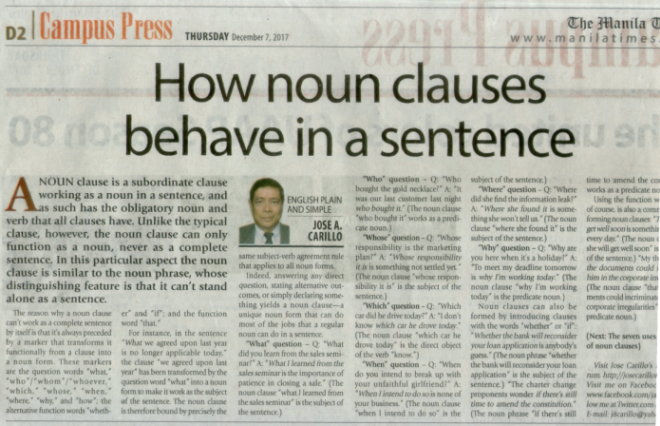A noun clause is a subordinate clause working as a noun in a sentence, and as such has the obligatory noun and verb that all clauses have. Unlike the typical clause, however, the noun clause can only function as a noun, never as a complete sentence. In this particular aspect the noun clause is similar to the noun phrase, whose distinguishing feature is that it can’t stand alone as a sentence.
IMAGE CREDIT: ENGLISH-GRAMMAR-REVOLUTION.COM IMAGE CREDIT: SLIDEPLAYER.COMThe reason why a noun clause can’t work as a complete sentence by itself is that it’s always preceded by a
marker that transforms it functionally from a clause into a noun form. These markers are the question words “what,” “who”/“whom”/“whoever,” “which,” “whose,” “when,” “where,” “why,” and “how”; the alternative function words “whether” and “if”; and the function word “that.”
For instance, in the sentence “
What we agreed upon last year is no longer applicable today,” the clause “we agreed upon last year” has been transformed by the question word “what” into a
noun form to make it work as the subject of the sentence. The noun clause is therefore bound by precisely the same subject-verb agreement rule that applies to all noun forms.
Indeed, answering any direct question, stating alternative outcomes, or simply declaring something yields a noun clause—a unique noun form that can do most of the jobs that a regular noun can do in a sentence.
“What” question – Q: “What did you learn from the sales seminar?” A: “
What I learned from the sales seminar is the importance of patience in closing a sale.” (The noun clause “what I learned from the sales seminar” is the subject of the sentence.)
“Who” question – Q: “Who bought the gold necklace?” A: “It was our last customer last night
who bought it.” (The noun clause “who bought it” works as a predicate noun.)
“Whose” question – Q: “Whose responsibility is the marketing plan?” A: “
Whose responsibility it is is something not settled yet.” (The noun clause “whose responsibility it is” is the subject of the sentence.)
“Which” question – Q: “Which car did he drive today?” A: “I don’t know
which car he drove today.” (The noun clause “which car he drove today” is the direct object of the verb “know.”)
“When” question – Q: “When do you intend to break up with your unfaithful girlfriend?” A: “
When I intend to do so is none of your business.” (The noun clause “when I intend to do so” is the subject of the sentence.)
“Where” question – Q: “Where did she find the information leak?” A: “
Where she found it is something she won’t tell us.” (The noun clause “where she found it” is the subject of the sentence.)
“Why” question – Q: “Why are you here when it’s a holiday?” A: “To meet my deadline tomorrow is
why I’m working today.” (The noun clause “why I’m working today” is the predicate noun.)
IMAGE CREDIT: SLIDESHARE.NETNoun clauses can also be formed by introducing clauses with the words “whether” or “if”: “
Whether the bank will reconsider your loan application is anybody’s guess.” (The noun phrase “whether the bank will reconsider your loan application” is the subject of the sentence.) “The charter change proponents wonder
if there’s still time to amend the constitution.” (The noun phrase “if there’s still time to amend the constitution” works as a predicate noun.)
Using the function word “that,” of course, is also a common way of forming noun clauses: “
That she will get well soon is something I pray for every day.” (The noun clause “that she will get well soon” is the subject of the sentence.) “My theory is
that the documents could incriminate him in the corporate irregularities.” (The noun clause “that the documents could incriminate him in the corporate irregularities” works as a predicate noun.)
 This essay, 1069th in the series, appeared in the column “English Plain and Simple” by Jose A. Carillo in the Campus Section of the December 7, 2017 issue (print edition only) of
This essay, 1069th in the series, appeared in the column “English Plain and Simple” by Jose A. Carillo in the Campus Section of the December 7, 2017 issue (print edition only) of The Manila Times
, © 2017 by the Manila Times Publishing Corp. All rights reserved.(Next:
The seven uses of noun clauses - 1) December 14, 2017